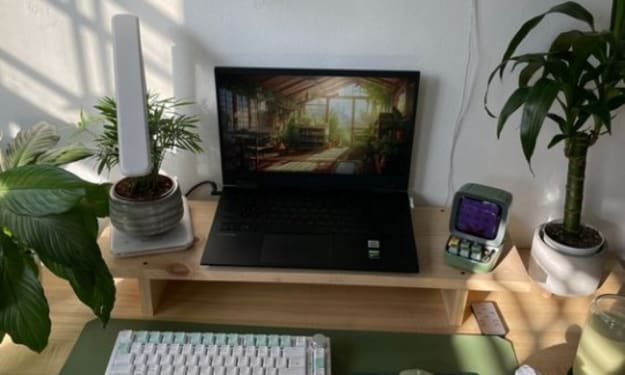Why the Moon Is the Most Fascinating
Of all of the celestial bodies, the moon will always be my favourite.

Every night when you look up into the night sky, with the exception of the new moon, you see a bright, glowing ball of beauty.
In the night sky we are reminded of how small and special we are. We exist among innumerable amounts of stars that exist in galaxies, which are spinning around black holes and colliding into other galaxies on a cosmic timeline that is truly unfathomable to humans.
Black holes, galaxies, giant stars, planets, dark matter—all of these are fascinating, but I will always see the moon as the most fascinating.
For starters, the moon is always constant. Although the amount of moon we see changes with the phases of the moon, the face of the moon remains the same.
This is fascinating because every explorer, every inventor, every evil, and every holy leader has gazed upon that same moon. I like to think about all of the things these people thought about as they looked up to the bright and beautiful moon.
In time when moonlight was the only source of light—before even gas lamps and candle sticks—the moon was all that we could trust to be there every night. Even with the changing faces of the moon, you knew the full moon would return.
The moon is also telling of the seasons. Sometimes appearing big and orange and reminding us of the season of harvesting and growth.
What is most fascinating about the moon is the eclipse. As many as five lunar eclipses are possible throughout the year. This is what happens when the earth completely blocks the sunlight from reaching the moon, blocking out the full moon for up to two hours. As it passes, there is a reddish glow around the moon. It is a subtle and beautiful reminder of the orbits of our sun, Earth, and moon. This romantic relationship between the Earth and moon constantly spinning side-by-side around the big ball of fire we call the sun.
All of the other celestial bodies and phenomena are fascinating. I was in absolute awe when I saw the first image of the black hole, and I made sure to share the story of the discovery of gravitational waves with all of my friends the moment it was released.
But still, the moon, in its simple beauty, is the most fascinating.
Our moon, which controls the tides of our little blue planet, is an extension of us. It is the result of a violent past, when the solar system was in its infancy. It shows that in times of immense conflict, beauty may still arise—all is not lost.
It reminds us how safe and protected we are here on Earth, with its many craters and impact marks from the debris that is flying through space. It reminds us that we are fragile, but that our little blue planet is the perfect safe place for us.
My mother tells the story of when she watched the moon landing. Sitting around the black and white television watching as a human being—an earthling—touched down on our moon. Our constant light in the night sky had finally been visited by one of us. I wish I could have been part of that moment. To feel the energy of the Earth shift, once again, for the moon.
Look up into the night sky and be amazed at what you see. Notice the flickering stars and know that they may not even exist anymore. Some of them exist as part of our galaxy, which spins about a black hole and could collide with another galaxy at lightyear-speed.
But when you look up, don't forget to notice the moon; our humble and powerful celestial companion.
About the Creator
Riley Pearce
A curious cancerian from the capital of Canada. My passions are science, space, fitness, food, and female health. Part-time dog walker and full-time aspiring dancer






Comments
There are no comments for this story
Be the first to respond and start the conversation.